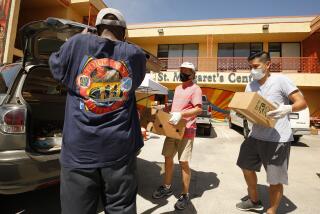Q & A
Barbara Johnson, Fullerton Interfaith Emergency Service
As executive director of Fullerton Interfaith Emergency Service, Barbara W. Johnson, 66, oversees a massive goodwill program that helps tens of thousands of needy people each year.
Her nonprofit organization, made up of 23 churches, a synagogue and the YWCA, runs a homeless shelter, New Vista, and a distribution center. Between seven and 10 families live at the shelter at any one time, and another 33,000 needy people receive free food, clothes or money to help pay rent or doctor bills or other emergencies each year through FIES’ distribution center at Maple School. The center is open Mondays through Fridays from 1 to 4 p.m.
Johnson began her career with FIES when it was created 21 years ago. She was one of the first volunteers. In 1982, she became the distribution center’s coordinator and was promoted to her current position in 1987. She manages all FIES operations and coordinates 150 volunteers.
Johnson, who also serves as a board member of the county’s Habitat for Humanity and the Homeless Issues Task Force, spoke with Times correspondent Mimi Ko Cruz.
Q: Why does FIES exist?
A: Our mission is to eliminate hunger and homelessness, and to do it through this cooperative community effort. We believe that everyone is part of God’s family and deserves to be treated with dignity and respect and be given the opportunity to obtain the basic necessities of life and a sense of self worth. We will have succeeded when we’re no longer needed. . . . I see this as a ministry of our congregations and community groups working together. If I weren’t doing this [as executive director], I’d be one of the volunteers.
Q: Who can benefit from FIES and how?
A: Through New Vista, we help homeless families-- a lot of single mothers and their children who are really struggling and on the edge. Families with children are taken into the shelter and taught about nutrition, money management and how to hold a steady job. We interview families for that program on Wednesdays. At the distribution center, just being in need is the sole criterion for receiving help in the form of a bag of groceries or money to pay a utility bill, rent, a prescription or motel vouchers. If we can’t help them, we refer them to other agencies.
Q: What will government funding cuts for programs like yours and the new federal welfare reform legislation do to FIES?
A: It will put pressure on nonprofit private organizations to provide more. We’re looking at the future and bracing. There are going to be more homeless people on the street, and no one group will ever be able to make a dent in the problem. But if we work together and share our resources, we can make a difference. There should be no need for a child to go hungry or a family to have to find shelter under a bridge.
More to Read
Sign up for Essential California
The most important California stories and recommendations in your inbox every morning.
You may occasionally receive promotional content from the Los Angeles Times.










